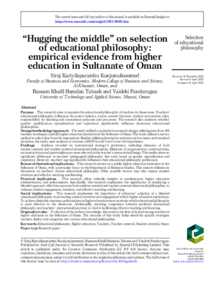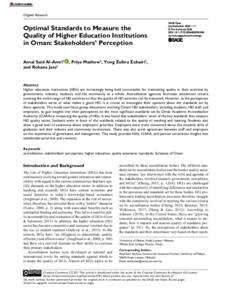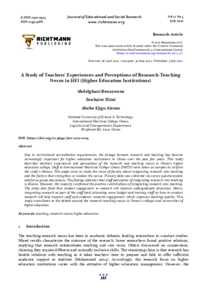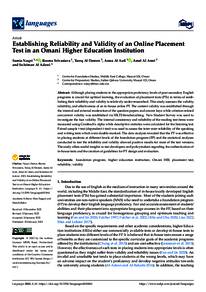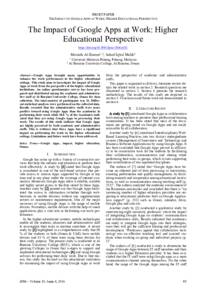وثيقة
“Hugging the middle” on selection of educational philosophy: empirical evidence from higher education in Sultanate of Oman.
المعرف
DOI: 10.1108/AGJSR-12-2022-0313
المصدر
Arab Gulf Journal of Scientific Research.
المساهمون
Pandurugan, Vaidehi., مؤلف
الدولة
England.
مكان النشر
Leeds
الناشر
Emerald Publishing.
ميلادي
2023-05-25
اللغة
الأنجليزية
الملخص الإنجليزي
Purpose: This research aims to examine the educational philosophy of teachers in classrooms. Teachers' educational philosophy influences the power balance, course content function, student and teacher roles, responsibility for learning and assessment purposes and processes. The research also analyzes whether gender, qualification, specialization and experience significantly influence classroom educational philosophies. Design/methodology/approach: The study utilized a quantitative research design, utilizing data from 193 teachers working in a public higher education institution in the Sultanate of Oman. The study utilized a survey method to solicit data from the respondents. Besides utilizing descriptive statistics such as mean and standard deviation, the study used analysis of variance (ANOVA) and t-test to test the hypotheses. Findings: Analysis revealed an instructional strategy's preference, including elements of both teacher-centered and student-centered educational philosophies. Elements of progressivism, constructivism, reconstructivism and perennialism are more relevant in the teacher's instructional design. The results show no significant differences in teachers' pedagogical philosophy that exist based on gender, specialization and experience. However, teachers' age significantly influences their educational philosophy preferences. Research limitations/implications: This research centers on a public higher education institution in the Sultanate of Oman, with a particular focus on the Department of Business Studies. This resarch delimits its discussion on teachers' chosen educational philosophy. Other possible factors may also impact student retention and effective teaching and learning. Practical implications: This research offers valuable insights to academicians, higher education administrators, and policymakers. Specifically, this research emphasizes the significance of employing a blended approach, which incorporates both student-centered and teacher-centered educational philosophies, to enhance student engagement, retention, and effective teaching and learning. Social implications: This research emphasizes the importance of educators' adoption of a blended educational philosophy in promoting student retention and engagement within higher education institutions. To achieve desirable outcomes, policymakers in higher education must ascertain which educational philosophy is most effective in the classroom. Additionally, ensuring congruence between preferred educational philosophy and teachers’ instructional practices is vital in facilitating effective teaching and learning. Originality/value: To the best of the authors’ knowledge, this study is the first of its kind among teachers in higher education in the Sultanate of Oman. The outcome of this study helps detail the specific strategies teachers deploy and categorize into various educational philosophies.
ISSN
1985-9899
قالب العنصر
مقالات الدوريات

